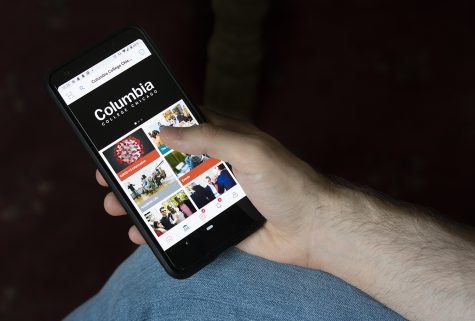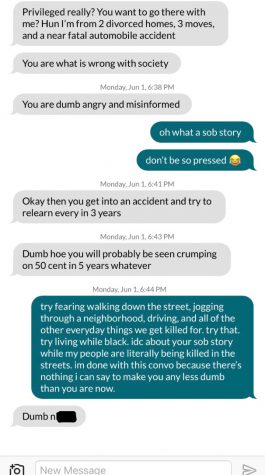Racial slur used on ColumbiaChi app initiates conflict among students
June 5, 2020

Editor’s Note: The Chronicle does not condone or promote the use of the racial slur included in this article, however it is used as a point of reference and contextual evidence relevant to the story. The Chronicle warns of its use, which may cause discomfort for readers.
A divisive weekend of protests following the death of George Floyd has led to heightened tensions over racial issues worldwide, and Columbia has been no exception.
Floyd, a black man who was held under the knee of a Minneapolis police officer for nearly nine minutes, died in what has been ruled a homicide by the Hennepin County Medical Examiner’s Office.
The topics of police brutality, protests, activism and the Black Lives Matter movement, which have dominated social media in recent days, also spilled over into an official Columbia communications channel.
On Monday, June 1, a conversation on the ColumbiaChi app about white privilege and differing experiences ended with a white student calling a black student the N-word through private messaging.
“I was a little shocked, I was like, ‘You’re really gonna do this while the world is how it is?’ I was kinda sick of it,” said freshman game art major Mackenzie Baker.
Baker, who was on the receiving end of the slur, captured screenshots and posted them to the ColumbiaChi app.
There they circulated widely, leading to dozens of upset comments and posts on the app. Students denounced racism, raised awareness for the Black Lives Matter movement and called for the student who sent the direct message to be reported to the school.

Messages between two Columbia students circulated widely on the ColumbiaChi app, causing many users to become angry at the racial slur and derogatory language used.
Following an email inquiry Tuesday, June 2, the student accused of sending the racist message declined to comment on the situation to the Chronicle.
Following an influx of reports made to the college Monday, June 1, a post on the app from Student Relations announced the Dean of Students and Equity Issues offices had launched an investigation into the incident. The student accused of using the slur was temporarily removed from the app for violating the college’s anti-discrimination and anti-harassment policy.
Baker said although an investigation is in progress, she is not optimistic about the college taking further action.
“It is a predominantly white school,” Baker said. “And it is liberal, but things like this [are] usually just pushed under the rug in most circumstances.”
Dean of Students John Pelrine said because the interaction took place on a platform the school owns, rather than on a separate social media app like Twitter, his office has more power and control over the conduct.
“It’s there to help build communities and build connections to the college,” Pelrine said. “It’s not a place where we want people to feel unsafe or to feel demeaned.”
Pelrine said his office usually only receives one or two formal complaints annually alleging violations of the anti-discrimination and anti-harassment policy, making this case rare.
Sophomore music business major Armand Rome created the initial post that sparked a heated conversation between Baker and the other student as a way of “condemning people trying to speak out and to belittle the Black Lives Matter cause.”
Rome said while he is glad the student who made the racist post is no longer allowed on the app, the college should take additional measures to address her behavior, along with others, moving forward.
Pelrine said he does not expect the investigation to take longer than a week or two. Depending on the findings, next steps could lead to no punitive action deemed necessary, a required apology, educational sanctions, community service, suspension or expulsion from the college, among other possible outcomes.
Charee Mosby-Holloway, director of Student Diversity and Inclusion, said screenshots of the messages hurt her on a personal level and were eye-opening from a professional standpoint.
“Sometimes at Columbia, we forget that our community is representative of the larger world that we live in,” Mosby-Holloway said. “It was a reminder to me we have a lot of work to do to educate ourselves and to create a more inclusive environment.”
Rome said he is “not surprised in the slightest” by the derogatory comments made due to the current situation.
“When you’re black, you go through these interactions every time a George Floyd dies,” Rome said. “People who are against the movement for Black Lives Matter … they tend to go to the same insults.”
Pelrine said the coronavirus pandemic, ongoing economic crisis and nationwide protests all likely factored into the exchange that transpired between the two students.
“There is a lot of tension out there, a lot of anger, tempers are flaring,” Pelrine said. “I think what happened on our app is symptomatic or illustrative of what’s going on in society at large.”
Rome said while all students have the right to voice their disagreements, “there’s a certain way that you need to come at us, in order for us to come back at you with cordialness … and with intention to come to an equal understanding.”
Mosby-Holloway said those seeking support in light of recent events can email Counseling Services or Student Relations. In addition, the Diversity and Inclusion Office will host a student-led online discussion session Tuesday, June 9 at 4 p.m. for people to “connect, support and heal from collective and ongoing racial trauma.”
“This is the actual work of inclusion,” Mosby-Holloway said. “It’s not always easy; it’s not always pleasant. You have to address the harm; you have to lean into the discomfort. … In the fight for racial justice and liberation, every single person has a role to play regardless of your identity.”







